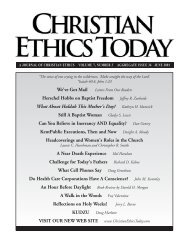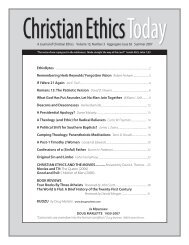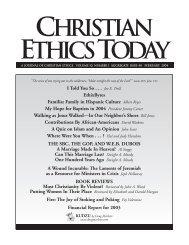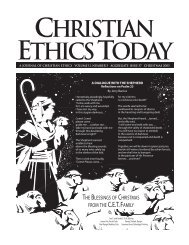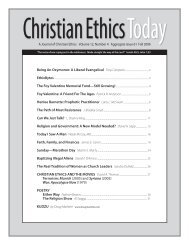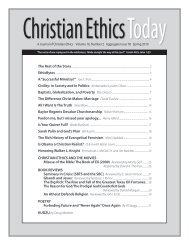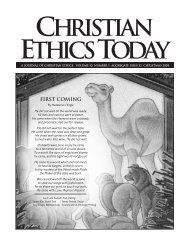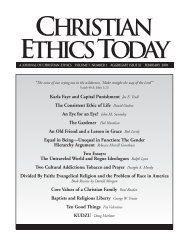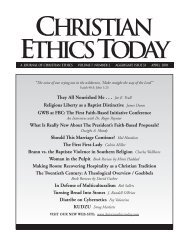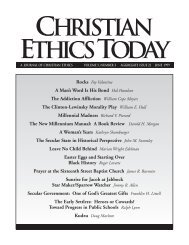Red-Letter Christians, An Emerging Evangelical Center, And Public ...
Red-Letter Christians, An Emerging Evangelical Center, And Public ...
Red-Letter Christians, An Emerging Evangelical Center, And Public ...
Create successful ePaper yourself
Turn your PDF publications into a flip-book with our unique Google optimized e-Paper software.
. . . I believe that the church exists for<br />
people we haven’t met yet. The church<br />
does not exist to maintain the institution<br />
and to keep the committees running<br />
and the budget afloat and the light bills<br />
paid, and if that’s why we exist we really<br />
ought to fold up and let somebody use the<br />
building that could do some good. . .<br />
It was a vision that shook them.<br />
This was someone who could turn<br />
First Decatur’s eyes toward its community<br />
once more. So they went to<br />
Calvary to see her work firsthand,<br />
spreading out among the crowd so<br />
as to not raise pastor-poaching suspicions.<br />
What they saw there convinced<br />
them. She was warm, funny, and gracious.<br />
Her preaching was from the<br />
Gospel; she was a woman of the Word.<br />
Britt left impressed. “Everything about<br />
her ministry and everything that we<br />
saw out there wasn’t about her, it was<br />
about God—and it was so refreshing<br />
to see this.” They called anyone<br />
they could think of who had crossed<br />
paths with Julie over the years, and the<br />
results were the same. Everyone they<br />
spoke with praised her, including Joy<br />
Yee, the current pastor of Nineteenth<br />
Avenue.<br />
“She has been gone from here nine<br />
years, but this congregation still pines<br />
for her.”<br />
It was time for a vote; it was down<br />
to three. The search committee talked.<br />
They prayed. <strong>An</strong>d then one of the<br />
seven finally spoke up.<br />
“I really feel led—why don’t we<br />
decide to make this a unanimous decision?”<br />
<strong>An</strong>d so they did.<br />
<br />
They then presented their nominee<br />
to the deacons. After a few looks of<br />
surprise, the deacons talked. They<br />
prayed. <strong>An</strong>d then one of them finally<br />
spoke up.<br />
“You guys, we’ve prayed for you<br />
for a year to do the right thing, and<br />
you tell us that the Holy Spirit led you<br />
here, and who are we to argue with<br />
that? I recommend that we unanimously<br />
adopt it.”<br />
<strong>An</strong>d so they did.<br />
After they presented their choice to<br />
the church, they brought Julie to speak<br />
before the final vote. <strong>An</strong>d though she<br />
had initially been wary of this “First”<br />
Baptist, she had seen something in the<br />
faces of the search committee that she<br />
could see in the faces before her now.<br />
Something that said maybe what has<br />
been isn’t what God means for it to<br />
be forever. Something that said maybe<br />
we’re ready to recapture a passion for<br />
God. Yes, she thought, these are people<br />
I can love.<br />
At the end of her sermon the congregation<br />
voted.<br />
Five hundred people.<br />
Five nays.<br />
A standing ovation.<br />
She was so called.<br />
God is mysterious. his “word,”<br />
the Bible, is mysterious. <strong>An</strong>d when<br />
<strong>Christians</strong> can’t agree with what the<br />
words inside that Word mean, it can<br />
spark hard feelings and rifts and bitterness<br />
and judgments and a hundred<br />
other perversions of what the record<br />
of God’s revelation of himself to mankind<br />
is supposed to represent: love.<br />
For Baptists, these differences of<br />
opinion often spring from the historic<br />
denominational principle of “priesthood<br />
of the believer”—in short, that<br />
each individual is free before God to<br />
interpret scripture. But when it comes<br />
to whether or not women are equally<br />
called to posts of leadership such as pastor<br />
or deacon, the scripture can seem<br />
inconsistent: the apostle Paul writes<br />
that a deacon should be the husband<br />
of one wife, yet he mentions Phoebe<br />
as a deacon, and so on. Confusing, yes.<br />
Contradictory? Within the context of<br />
first-century culture and the specific<br />
problems being addressed by the scriptures,<br />
not necessarily.<br />
Verily, both sides of the debate<br />
believe the Bible to be a divinely<br />
inspired verity. However, what the side<br />
that most often brands itself “complementarian”<br />
(women’s spiritual gifts are<br />
complementary, not equal, to men’s)<br />
most often accuses the other side, the<br />
“egalitarians,” of doing—picking and<br />
choosing scripture to fit their needs—<br />
they are guilty of themselves. After all,<br />
few Baptists follow other seemingly<br />
first-century-related New Testament<br />
decrees such as the ban on women<br />
wearing gold or pearls or expensive<br />
clothes in church (1 Tim 2:9).<br />
But some Baptists have taken the<br />
issue further. In 2000, the Southern<br />
Baptist Convention (SBC), which represents<br />
the country’s largest Protestant<br />
denomination, changed its statement<br />
of beliefs, The Baptist Faith and<br />
Message, to specifically limit the office<br />
of pastor to men. While not a creed<br />
per se—Baptist churches are autonomous—its<br />
inclusion, to some, was dis-



